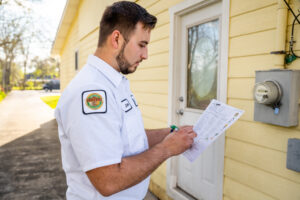 Electrical safety is not something to push aside until a problem shows up. A professional inspection helps keep your home safe. It also makes sure you follow electrical codes. Plus, it saves money by finding problems early.
Electrical safety is not something to push aside until a problem shows up. A professional inspection helps keep your home safe. It also makes sure you follow electrical codes. Plus, it saves money by finding problems early.
This guide explains what an electrical inspection is, when you need one, what the inspections process includes, common issues inspectors find, and how to prepare.
What Is an Electrical Inspection?
An electrical inspection is a detailed review of your home’s electrical components performed by a licensed electrician. The inspector will check your service panel, wiring, outlets, switches, light fixtures, and safety devices.
The goal is simple: keep your electrical system safe, avoid electrical shocks, and lower the risk of electrical fires.
During the inspection, the electrician checks if your system meets the National Electrical Code (NEC). They also find potential hazards before they lead to expensive repairs.
When Do You Need an Electrical Inspection?
You don’t have to wait until a breaker trips or wiring smells like it is burning to schedule an inspection. Here are the most common times when to schedule an electrical inspection:
Annual Home Inspections
A yearly check keeps your electrical system safe and efficient. Inspectors look for signs of wear, loose connections, and outdated equipment that may fail without warning.
Buying or Selling a Home
An electrical inspection for home purchase protects both buyers and sellers. Buyers get peace of mind about the home’s electrical safety, while sellers can fix issues before they block a sale.
Renovations or System Upgrades
Before adding a new appliance or finishing a remodel, schedule an inspection. The electrician ensures the service panel and circuit breakers can handle extra load.
Older Homes and Outdated Wiring
If your home is more than 30 years old, your wiring may not meet current standards. Outdated wiring increases the risk of electrical fires. An inspection will reveal whether upgrades are needed.
What Does an Electrical Inspection Include?
 The inspections process covers every part of your system. Here’s what an inspector will check:
The inspections process covers every part of your system. Here’s what an inspector will check:
Electrical Panel Check
- Inspect circuit breakers and fuses.
- Confirm amperage capacity supports appliances and HVAC.
- Look for visible damage, rust, or overheating in the electrical panel.
Wiring and Connections
- Identify frayed wires, loose connections, or exposed conductors.
- Check materials for age and safety.
- Verify junction boxes are properly secured.
Outlets and Switches
- Test standard outlets, GFCI outlets, and arc fault circuit interrupter (AFCI) breakers.
- Confirm outlets are grounded and safe for daily use.
- Ensure outlets near water follow electrical code.
Light Fixtures and Appliances
- Inspect light fixtures for proper installation.
- Confirm no overheating or signs of wear.
- Ensure appliances are on dedicated circuits where required.
Grounding and Bonding
- Check grounding system to prevent electrical shock.
- Confirm bonding connections keep current flowing safely.
Safety Devices
- Test smoke detectors and carbon monoxide detectors.
- Inspect surge protection systems.
- Confirm safety devices are correctly wired and functional.
Common Issues Found During Electrical Inspections
Electrical inspectors often discover hidden risks that can turn serious if left unresolved.
Outdated or Unsafe Wiring
Old wiring materials, such as aluminum or knob-and-tube, create potential hazards.
Overloaded Circuits
Too many devices on one circuit can cause overheating and failure.
Missing or Faulty GFCIs
Wet areas without GFCI outlets increase the chance of electrical shock.
Improper Grounding
Poor grounding can damage electronics and put people at risk.
Old or Recalled Electrical Panels
Panels like Federal Pacific or Zinsco are known to fail under stress. Inspectors flag these immediately.
 Benefits of Regular Electrical Inspections
Benefits of Regular Electrical Inspections
- Prevent electrical fires and shocks before they happen.
- Extend the life of your electrical components.
- Save money by repairing minor issues instead of replacing major systems.
- Ensure compliance with electrical code and insurance requirements.
How to Prepare for an Electrical Inspection
Make the visit easier and faster by preparing in advance:
- Clear access to service panels, outlets, crawl spaces, and attics.
- Make a list of known issues, such as flickering lights or tripping circuit breakers.
- Gather past records of electrical service or installation.
FAQ: Electrical Inspections
How long does an electrical inspection take?
Most inspections take one to three hours, depending on the home’s size and number of electrical components.
How often should you get an electrical inspection?
Schedule a professional check every year, or sooner if your home is older or you notice warning signs.
Who is qualified to perform an electrical inspection?
Only a licensed electrician should handle inspections. This ensures your system meets electrical safety and code requirements.
What happens if my home fails an electrical inspection?
The inspector provides a report listing repairs. Address urgent issues first, such as faulty wiring or unsafe panels.
Why Electrical Inspections Matter
 A professional inspection protects your home, your family, and your investment. Annual checks prevent electrical shock, keep your system safe, and lower the risk of electrical fires.
A professional inspection protects your home, your family, and your investment. Annual checks prevent electrical shock, keep your system safe, and lower the risk of electrical fires.
At Right Touch Electrical, we provide electrical inspections with quality with a master’s touch. Our licensed electricians serve Houston, TX, and surrounding areas.
Protect your home, your family, and your investment—book an inspection today with Right Touch Electrical.